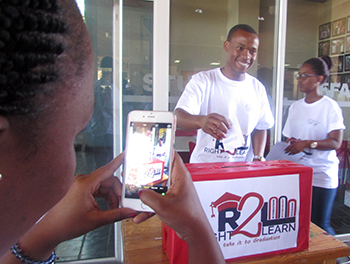Latest News Archive
Please select Category, Year, and then Month to display items
12 October 2020
|
Story Arina Engelbrecht
|
Photo Supplied
 Arina Engelbrecht from Organisational Development and Employee Well-being believes physical activity has a number of benefits for one’s health, including stress relief.
Arina Engelbrecht from Organisational Development and Employee Well-being believes physical activity has a number of benefits for one’s health, including stress relief.
Being physically active plays a big role in preventing the development of mental-health problems and in improving the quality of life of people experiencing mental-health problems.
Treatment for depression
Physical activity can be an alternative treatment for depression. It can be used as a stand-alone treatment or in combination with medication and/or psychological therapy. It promotes all kinds of changes in the brain, including neural growth, reduced inflammation, and new activity patterns are formed that promote feelings of calm and well-being. It releases endorphins – powerful chemicals in the brain that energise your spirit and make you feel good.
Physical activity can be very effective in relieving stress. Research in adults has found that physically active individuals tend to have lower stress levels compared to individuals who are less active. It also leads to improved sleep. When a person sleeps better and feels more rested, overall quality of life improves. They cope better with daily life stressors.
Reduce Alzheimer's risk
Regular physical activity can reduce your risk of developing Alzheimer's disease by up to 50%. It can also slow down further deterioration in those who have already started to develop cognitive problems. It stimulates the brain’s ability to maintain old connections as well as to make new ones.
A study asked people to rate their mood immediately after periods of physical activity (e.g. going for a walk/run, cycling, doing housework) and periods of inactivity (e.g. reading a book or watching television). Researchers found that participants felt more content, more awake, and calmer after being physically active compared to after periods of inactivity.
In conclusion, people who are physically active feel a sense of well-being, feel more energetic throughout the day, sleep better at night, have sharper memories, and feel more relaxed and positive about themselves and their lives.
“Being physically active not only changes your body, it changes your mind,
attitude, and your mood.” – Arina Engelbrecht
Right to Learn campaign seeks to fund financially needy students
2015-11-11
 SRC President, Lindokuhle Ntuli, pledges financial support to the Right to Learn campaign.
Photo: Tango Twasa |
In response to the dire need for financial relief for academically deserving students from underprivileged backgrounds, the Student Representative Council (SRC) of the University of the Free State (UFS) launched the Right to Learn campaign on Friday 30 October 2015. The campaign, which aims to counter deregistration, was initiated following the national #FeesMustFall campaign, which gained momentum after students from the University of Witwatersrand first mobilised against the proposed fee increases for 2016.
The SRC’s Projects Committee realised that, although President Jacob Zuma had consented to a 0% increment, the lack of an increase would not eliminate the financial burden currently facing some students.
“The campaign was conceived at the SRC’s strategic planning meeting, and is now spearheaded by the SRCs Projects Committee,” said Letsika Leqoalane, SRC: Academic Affairs. “The campaign was founded on the university's value of ‘Superior Scholarship’ and the SRC’s value of reducing student financial exclusions,” he added.
Students in pursuit of continued access to education
The Right to Learn campaign was established as a supplementary initiative to the #FeesMustFall movement. “The Right to Learn campaign is an initiative to raise funds for students who are facing financial exclusion in the coming year,” said the SRC Academics Affairs officer.
All proceeds will be channeled towards reducing the number of students who will face de-registration in 2016, the SRC textbook bursary, and food bursaries. “This campaign stands on three pillars, namely: no to de-registration, no to student food insecurity, and yes to textbooks,” explained Leqoalane.
A call for support
According to SRC President, Lindokuhle Ntuli, “SRC members have made pledges of no less than R500 each from their own pockets.” The SRC is appealing to the UFS community to make donations into the campaign bank account, and thereafter to email the proof of payment to Ntuli at NtuliL@ufs.ac.za. The account details are:
Account number: 15-7085-0721 ABSA Bank Branch
Reference: SRC FUND
Branch Code: 632005 Cheque Account
Swift code: ABSAZAJJ